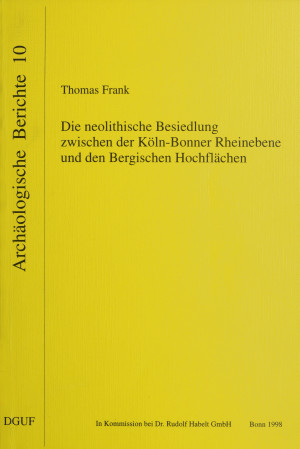Frank, Thomas
Die neolithische Besiedlung zwischen der Köln-Bonner Rheinebene und den Bergischen Hochflächen
The significance of findings in the uplands from the Neolithic Age has caused controversial discussions since the 1950s, because only stone finds, especially single finds of stone ax blades, were known. Numerous further sites were discovered over the decades. These included stone devices from the Neolithic Age that indicate the existence of settlements. With this, there is increased evidence that these finds do not stem from losses or remains of hunting patrols, nor are they artefacts (thunderbolts) that had been moved back in historical times.
In 1954 Marschall, Narr and von Uslar created a map of the Bergisches Land which included only few Neolithic archaeological sites. Since then “laymen” researchers have found hundreds of prehistoric sites the sources of which have not been evaluated yet in a summarizing manner. Of the 975 prehistoric sites that are presented in the catalogue of this work 400 of them also comprise Neolithic stone artefacts. In addition to this almost 100 single finds of flint ax blades are included.
In this archaeological landscape the author examines a transect from the Rhine Plain to the Bergische Hochflächen (Bergische Upper Plains), embeds the Neolithic finds in their chronologic and topographic contexts and links them to Mesolithic places. This results in a mid- to late-Neolithic settlement of varying intensity. The sites clearly are located where the best soil is available. In contrast, the mixed Mesolithic-Neolithic sites distinctly display a different topography where soil quality apparently seems to have been of minor relevance for the selection of respective locations. The single finds of flint axe blades that have been so controversy discussed in research history signify the close surroundings of these settlements. With this, varying and possibly complementary prehistoric economic systems become apparent.








